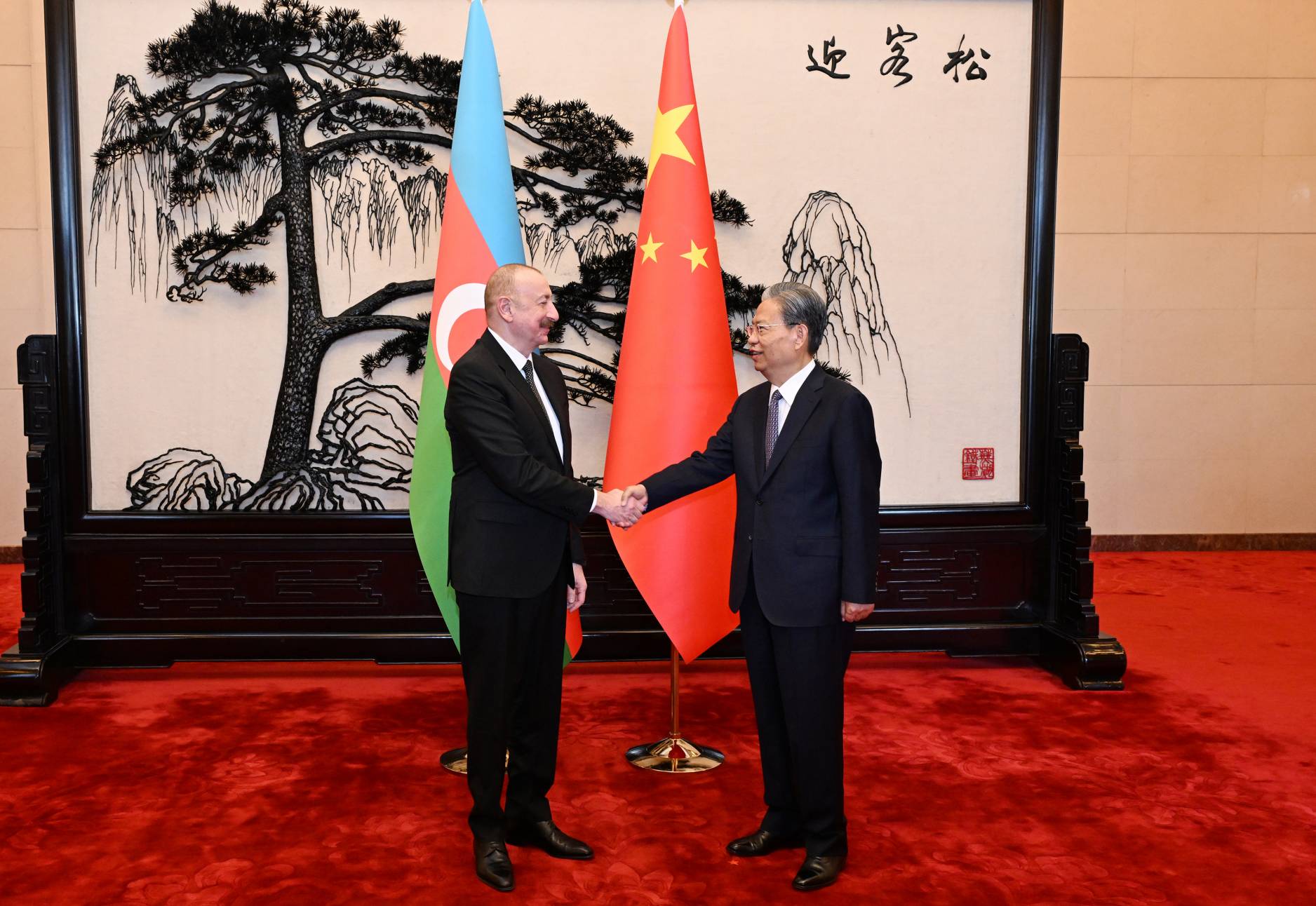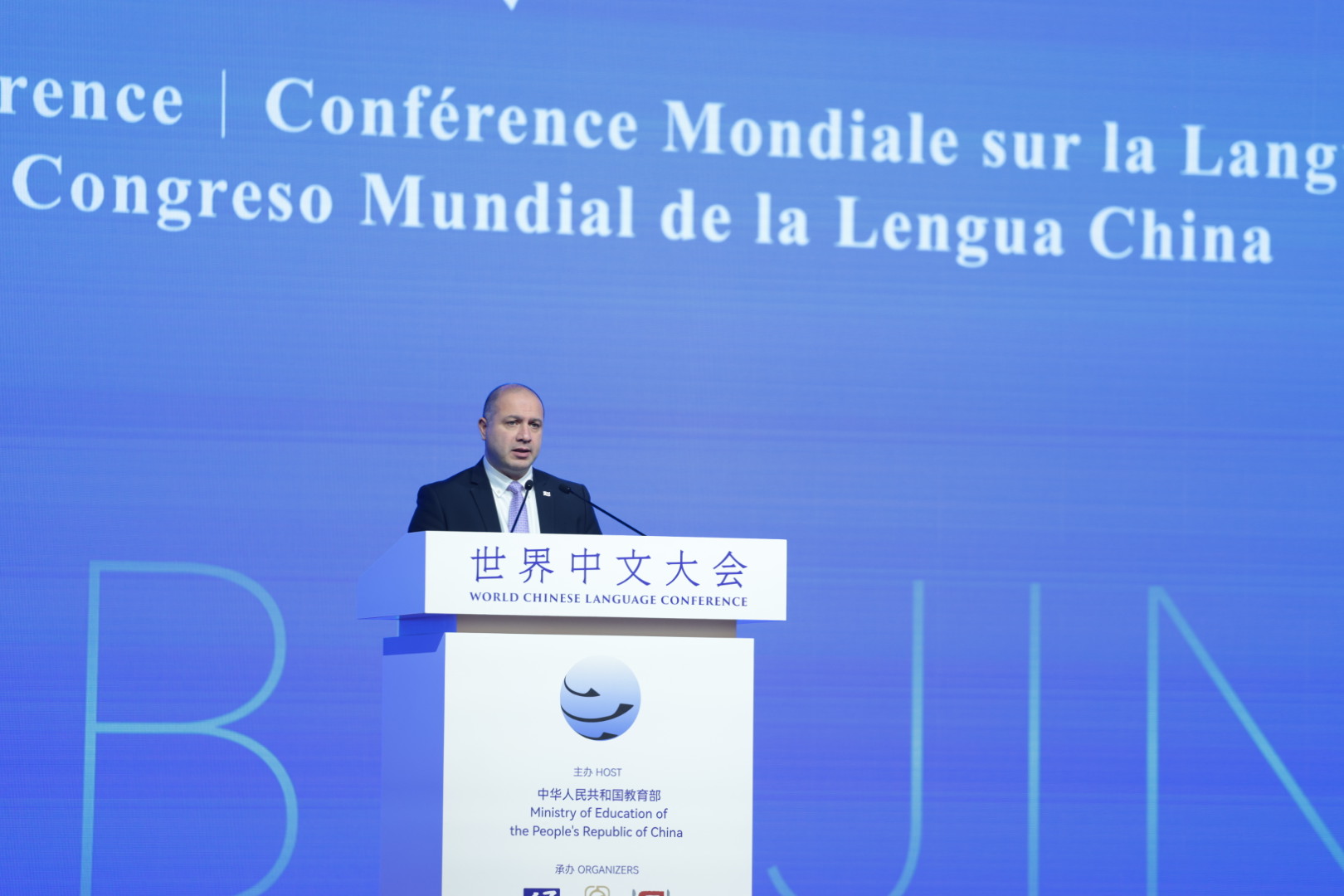
Azerbaijan and the People’s Republic of China Announce Comprehensive Strategic Partnership
Azerbaijan and the People’s Republic of China Announce Comprehensive Strategic Partnership
Executive Summary:
- On April 22, Azerbaijani President Ilham Aliyev conducted a state visit to the People’s Republic of China (PRC) to strengthen Azerbaijan’s role as a transit hub between the PRC, Central Asia, and Europe and expand the Azerbaijan-PRC partnership to new spheres.
- Azerbaijan–PRC cooperation has been based on Azerbaijan’s role as a transit hub but is evolving to include cooperation in energy and key industrial sectors, such as oil and gas, metallurgy, construction materials, pharmaceuticals, and food production.
- Azerbaijan has devoted enormous resources to attracting PRC and Western use of the Middle Corridor, massively improving and modernizing its trade infrastructure, and optimizing cargo transportation.
On April 22, Azerbaijani President Ilham Aliyev conducted a state visit to the People’s Republic of China (PRC), meeting with President Xi Jinping to cement the bilateral partnership that began in 2024 (PRC State Council Information Office, April 24). During the visit, Aliyev and Xi signed an agreement to establish a Comprehensive Strategic Partnership between Azerbaijan and the PRC (China Brief, September 20, 2024; President of Azerbaijan, April 23). The visit came at a tense time for the PRC as an intensifying trade war with the United States motivates Beijing to seek alternative transit routes and destinations for exports. Azerbaijan’s role as a viable transit hub between the PRC, Central Asia, and Europe positions it to cultivate partnerships with nearly all regional states. Baku accordingly plays a role in both the PRC-led “One Belt One Road” (OBOR) initiative and the Middle Corridor, underscoring Azerbaijan’s growing of ties with the PRC and European Union (see EDM, April 30, 2019, October 28, 2024, February 19, April 23; Trend.az, April 24; see China Brief, June 21, 2024).
Azerbaijan pursues multifaceted relationships with the PRC, Central Asia, and the European Union, focusing on building trade infrastructure. Azerbaijan’s growing role as a transit hub for trade enhances its international position amid the shifting geopolitical landscape in Eurasia and Europe stemming from Russia’s ongoing war against Ukraine and energy deficits (see EDM, March 20, 24). Trade between Azerbaijan and the PRC rose $3.744 billion in 2024, a 20.7 percent increase from the previous year that made Beijing Azerbaijan’s fourth largest trading partner (Caspian News, April 22). This makes the signing of the Comprehensive Strategic Partnership particularly timely for both states.
The Comprehensive Strategic Partnership includes several new agreements between Azerbaijani and PRC governmental bodies in key industrial sectors, including oil and gas, renewable energy, chemicals, metallurgy, mining, textiles, automotive manufacturing, construction materials, pharmaceuticals, and food production (News.az, April 24). Azerbaijan and the PRC have reached new energy agreements, which include PRC investment in the construction of new solar and wind power plants in Azerbaijan as well as a battery energy storage system (Azerbaijan Today, April 23). One energy agreement outlines the PRC’s Universal Energy Co. as the main investor in Azerbaijan’s 100 MW Gobustan Solar Power Plant Project (Interfax, April 22).
Transport and logistics remain the essential components of the PRC-Azerbaijan relationship. Aliyev praised the current state of Azerbaijan’s transport partnership with the PRC, claiming that Azerbaijan is the second largest investor in OBOR projects after the PRC (Intellinews, April 22). Aliyev’s remarks about the OBOR initiative are unsurprising considering Azerbaijan’s commitment to boosting the capacity of the Middle Corridor, a trade route that links Europe and the PRC, bypasses Russia, and reduces reliance on traditional sea routes (see EDM, February 19). Kazakh and Azerbaijani shipping companies project that 2025 cargo volume within the Middle Corridor, consisting of routes through Kazakhstan, Azerbaijan, Georgia, and Türkiye, will reach 96,000 twenty-foot equivalent units (TEUs), 88,000 TEU of which will travel westward in the Aktau-Alyat direction (see EDM, January 28; Report.az, March 4).
The PRC’s interest in creating a new partnership with Azerbaijan lies mainly in the view that Baku offers advantages to Beijing’s Eurasian economic strategy. Azerbaijan considers investment from the PRC an opportunity to diversify its non-oil economy by attracting PRC investments and strengthening its role in global supply chains. Azerbaijan has devoted enormous resources to attracting both PRC and Western use of Azerbaijani trade routes, massively improving and modernizing the country’s trade infrastructure, including railway and highway networks (see EDM, October 23, 2024, March 26, April 23). Azerbaijan optimized cargo transportation by implementing custom tariffs, launching a platform that enables companies to track their goods digitally, and expanding the Caspian’s main seaport to become a major Eurasian trade hub (Report.az, March 4). As a part of Azerbaijan’s trade infrastructure improvements, in 2024, Aliyev announced a second phase of expansion at the Baku Alat Sea Port, boosting its annual capacity to 25 million tons (see EDM, April 23). In February, Aliyev decided to merge the Baku International Sea Trade Port Closed Joint Stock Company with the Azerbaijan Railways Company Closed Joint Stock Company, in a bid to attract more foreign investment and foster the growth of the Middle Corridor (Azernews.az, February 25). The move was aimed at optimizing cargo transportation delivered from the PRC via the Caspian Sea and further loading onto cargo trains while avoiding bureaucracy and additional fees between the two enterprises.
The new Azerbaijan–PRC Comprehensive Strategic Partnership positions the two countries to yield mutual economic benefits in the medium and long term and pave the way for future cooperation. Kinship with China is attractive for Azerbaijan given its valuable assets and financial resources. Azerbaijan’s pursuit of deeper ties with the PRC demonstrates its ambition to lead regional economic and political connectivity, especially as the PRC is positioned to potentially become a key investor in Azerbaijan’s infrastructure development and new clean energy projects (COP29, accessed May 1). Conversely, partnership with Azerbaijan is an opportunity for the PRC to solidify its influence in the South Caucasus while ensuring access to the only land trade route to Europe that bypasses Russia. Moscow is certain to be monitoring Beijing’s growing footprint in Central Asia as the latter cultivates new bilateral and multilateral partnerships to establish alternative trade routes and energy sources between east and west.


